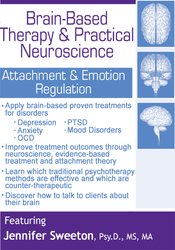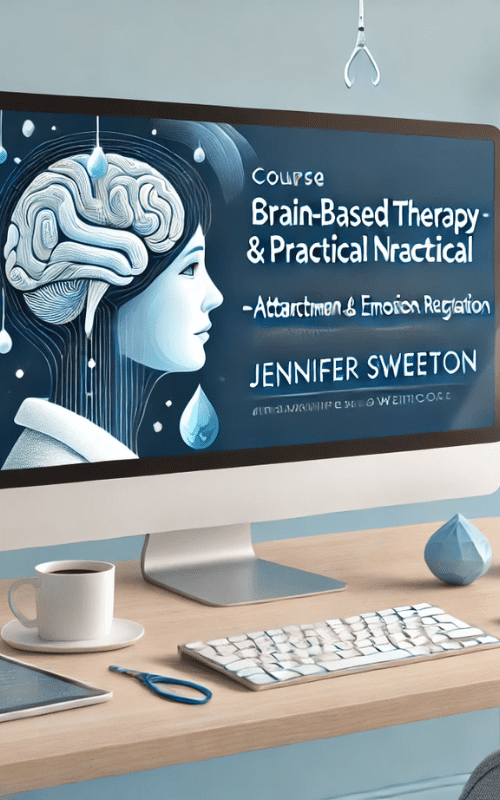Brain-Based Therapy & Practical Neuroscience -Attachment & Emotion Regulation – Jennifer Sweeton
Brain-Based Therapy & Practical Neuroscience -Attachment & Emotion Regulation – Jennifer Sweeton has the same quality as the author’s salapage.
Overview
Salepage check: Brain-Based Therapy & Practical Neuroscience -Attachment & Emotion Regulation
Author: Jennifer Sweeton
- Faculty:
- Jennifer Sweeton
- Duration:
- 6 Hours 28 Minutes
- Format:
- Audio and Video
- Copyright:
- Aug 04, 2017
Description
- Apply brain-based proven treatments for disorders:
- Depression
- Anxiety
- OCD
- PTSD
- Mood disorders
- Improve treatment outcomes through neuroscience, evidence-based treatment and attachment theory
- Learn which traditional psychotherapy methods are effective and which are counter-therapeutic
- Discover how to talk to clients about their brain
This seminar focuses on the revolution and sea change occurring in psychotherapy. It describes how to conceptualize psychotherapy based on an integrative model that discards the need for the “schools of psychotherapy.” Special attention will be on how to talk about the brain in therapy to motivate clients to try evidenced-based interventions.
Watch this seminar and learn how to optimize therapy for a variety of clients by harnessing the latest knowledge from neuroscience; developmental psychology; psychotherapy research; evidence-based practice; attachment research; and psychodynamic and cognitive behavioral approaches. Take home practical strategies for anxiety disorders such as OCD, Generalized Anxiety Disorder, Panic Disorder and PTSD; as well as for depression.
Handouts
| Manual ZNM052350 (1.97 MB) | 66 Pages | Available after Purchase | |
| Extra Resources (13.45 MB) | 144 Pages | Available after Purchase |
Outline
Psychotherapy in the 21st Century
- The integrative approach—no more need for the “schools” of psychotherapy
- Variables in successful treatment
- Outcomes management
- BASE (Brain, Alliance, System and Evidence-Based Practices)
What Neuroscience Offers to Therapy
- Emotion: laterality and lobes
- The role of attention and affect regulation: prefrontal lobes
- How to change the brain in successful therapy: neuroplasticity
- New neurons in the brain: neurogenesis
- The social brain, empathy and attachment
Developmental Neurobiology Brain Development
- Deprived vs. enriched environments
- Temperament and attachment in therapy
- Durability of attachment schema into adolescence and adulthood
- The development of the adolescent brain
- The aging brain
The Role of Memory
- The fundamental role of memory in therapy
- Implicit and explicit memory and how they can become dysregulated
- Hippocampus and amygdala dynamics
- Memory improvement techniques
The Stress Response System
- Historical models and the current view
- A balanced perspective of stress: allostasis
- When stress breaks down the system: allostatic load
- Adverse childhood experiences and how they affect adulthood
Working with the Neurodynamics of Anxiety Disorders: Tame the Amygdala
- GAD
- Panic
- OCD
- PTSD
Working with the Neurodynamics of Depression
- Limitations of the neurotransmitter/medication models
- The role of labeling emotions: hemisphere laterality
- Cytokines—sickness behavior
- Activity reward system—behavior activation
- Mindfulness
Healthy Habits—Planting SEEDS
- Sleep hygiene
- Exercise—BDNF—miracle grow
- Education—cognitive
- Diet—amino acids, fatty acids and vitamins
- Social medicine
- Mindfulness
Faculty

Jennifer Sweeton, Psy.D., M.S., M.A. Related seminars and products: 12
Organizational Consultant, Clinical Psychologist
Mind Works Professional Education Inc
Dr. Jennifer Sweeton is a licensed clinical psychologist, author, and internationally-recognized expert on trauma, anxiety, and the neuroscience of mental health. Dr. Sweeton has been practicing EMDR for nearly a decade and has treated a variety of populations using EMDR and other memory reconsolidation approaches, including combat veterans, individuals with PTSD and complex trauma, and those suffering from treatment-resistant anxiety.
She completed her doctoral training at the Stanford University School of Medicine, the Pacific Graduate School of Psychology, and the National Center for PTSD. Additionally, she holds a master’s degree in affective neuroscience from Stanford University, and studied behavioral genetics at Harvard University.
Dr. Sweeton resides in the greater Kansas City area, where she owns a group private practice, Kansas City Mental Health Associates. She is a past president of the Oklahoma Psychological Association and holds adjunct faculty appointments at the University of Kansas School of Medicine. She is the president-elect of the Greater Kansas City Psychological Association. Dr. Sweeton offers psychological services to clients in Oklahoma, Kansas, and internationally, and is a sought-after trauma and neuroscience expert who has trained thousands of mental health professionals in her workshops.
Speaker Disclosures:
Financial: Jennifer Sweeton is in private practice. She has an employment relationship with the Oklahoma City VAMC. Dr. Sweeton receives a speaking honorarium from PESI, Inc.
Non-financial: Jennifer Sweeton has no relevant non-financial relationship to disclose.
Curriculum
FAQs
Requirements
- A reliable internet connection to access the digital course.
- A computer, tablet, or smartphone to view course materials.
- Basic knowledge of psychology or therapy is beneficial but not required.
- Interest in neuroscience, emotional well-being, or therapeutic techniques.
Features
- Comprehensive Curriculum: Learn practical neuroscience concepts to improve therapy outcomes.
- Expert Instruction: Led by Jennifer Sweeton, a renowned neuroscience expert and clinician.
- Flexible Learning: Access course materials anytime with digital delivery.
- Cutting-Edge Insights: Understand the latest techniques in brain-based therapy and emotion regulation.
- Real-Life Applications: Translate theoretical neuroscience into practical therapeutic strategies.
- Cost Efficiency: Save up to 80% compared to the original SalePage price.
Target audiences
- Therapists, psychologists, and counselors seeking to enhance their practice.
- Mental health professionals interested in evidence-based neuroscience applications.
- Educators and researchers focusing on emotional regulation and attachment theories.
- Individuals passionate about understanding the connection between brain function and behavior.



